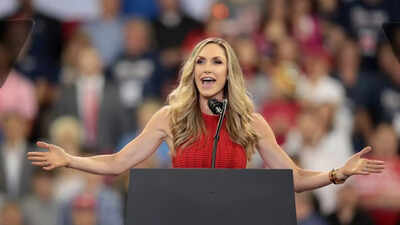
US President Donald Trump suggested his daughter-in-law Lara Trump as a potential candidate to replace outgoing Senator Thom Tillis in North Carolina, signaling a high-profile shakeup in one of the most competitive Senate races of the 2026 midterm elections.
Tillis, a rare Republican critic of Trump's recent tax-cut and spending bill, announced he will not seek reelection, opening the door for a potential Trump family-backed campaign in a key battleground state.Speaking aboard Air Force One, Trump praised Lara Trump as his “first choice” for the seat, citing her North Carolina roots and growing national profile. Though she currently resides in Florida, the president emphasized her deep ties to the state and her frequent visits.
Lara Trump, a former co-chair of the Republican National Committee and current FOX News host, has yet to comment publicly on her intentions.As speculation swirls around her potential Senate bid, attention has also turned to Lara Trump's educational background—offering insight into the academic journey that shaped her career in media and politics.Early years and high schoolLara Lea Yunaska, who later became Lara Trump by marriage, was born on October 12, 1982, in Wilmington, North Carolina.
She grew up in nearby Wrightsville Beach and attended Emsley A. Laney High School, a public school known for its strong academic and extracurricular programs. Though she participated in activities like cheerleading and gymnastics, there is little public record of standout academic honours during this period.
Her high school years appear to have been fairly typical of a suburban North Carolina upbringing.
North Carolina State University: Bachelor’s in Communication (cum laude)
Lara enrolled at North Carolina State University in Raleigh, a respected public institution. She pursued a Bachelor of Arts in Communication, graduating
cum laude
, which is a Latin honour indicating a GPA typically between 3.5 and 3.7.
This suggests a strong ability to articulate ideas effectively—whether in writing, speech, or media—skills she later leveraged in both television and politics.NC State’s communications program is comprehensive, covering journalism, public relations, media studies, and more. Graduates often build careers in broadcasting, digital media, or corporate communications, all fields where Lara later made her mark.The Culinary Institute: An additional creative disciplineAfter college, Lara pursued further training at the French Culinary Institute in New York, now called the International Culinary Center. She earned an Associate of Applied Science in Pastry Arts, indicating not only academic but also technical and artistic mastery in culinary arts.This credential reflects her diverse interests: journalism and communications on one hand, and culinary technique on the other. It is a noteworthy blend, revealing an individual unafraid to explore creative disciplines early in her career.
From culinary to media production
Lara’s transition to television began post-culinary school. In the early 2010s, she moved to New York City and worked as a television producer and story coordinator for
Inside Edition
, a syndicated news-magazine show, from around 2012 to 2016. Though
Inside Edition
is more entertainment than hard news, this role demanded strong storytelling skills, editorial judgment, and a grasp of what resonates with audiences, all foundations traceable back to her communications degree.Political communication and campaign strategyFollowing her stint in TV, she joined the Trump campaign in 2016 as a digital consultant and fundraiser, again leaning heavily on communication skills. In 2024, she was elected co-chair of the Republican National Committee alongside Michael Whatley. While this appointment sparked controversy over nepotism, her educational background in communications provided obvious tools for messaging, strategy, and organisation.Lara’s move into journalism—first as a Fox News contributor and later as the host of “My View with Lara Trump”—started in early 2021 and became formalised with her weekend TV show debut in February 2025. These roles directly align with her academic training: research, rhetoric, storytelling, interviewing, and placing narratives into broader political contexts.
Strengths and limitations of her academic credentials
Strengths
Her education shows:
- Strong communication skill set: Earning cum laude from a reputable communications program suggests that she mastered writing, public speaking, and critical thinking, all essential in media and political strategy.
- Creative versatility: The culinary degree shows she possesses discipline, creativity, and technical skill, traits useful in professional branding and public presentation.
- Applied learning: Her early jobs relied on editorial and creative judgment, skills directly compatible with her academic training.
Limitations and critics’ view
Some critics argue that while she has relevant academic credentials, her rapid political ascent owed more to family ties than formal qualification.
Skeptics question whether a BA and pastry arts diploma suffice for high-level political leadership. Compared to political science, law, public policy, or graduate study in government, her formal education did not provide policy training. Instead, her learning has been more experiential, built on campaign work and RNC leadership—informal, practical, and hands-on.Yet in today’s media-driven politics, communication often matters more than policy depth.
The ability to craft a narrative, rally supporters, and respond instantly is a form of leadership in itself, and on those metrics, her academic background has been sufficient.
Will her education help?
Lara Trump’s cum laude BA in Communication and Associate degree in Pastry Arts illustrate a solid grounding in storytelling, presentation, creativity, and discipline. These qualify her well for roles in media, campaign communications, and organisational leadership.
However, her lack of formal graduate-level policy education may be viewed as a gap, particularly if she seeks elective office such as a US Senate seat, where voters may expect deeper expertise in governance, law, or public policy.
Still, her leap from TV production to campaign co-chair to Fox News host is in many ways a natural progression based on her educational background. If she embarks on a Senate run, she will need to supplement academic credentials with policy experience or advanced study. But it would be a mistake to undervalue the strategic and rhetorical skills that her formal education already provides.

 19 hours ago
54
19 hours ago
54




























 English (US)
English (US)